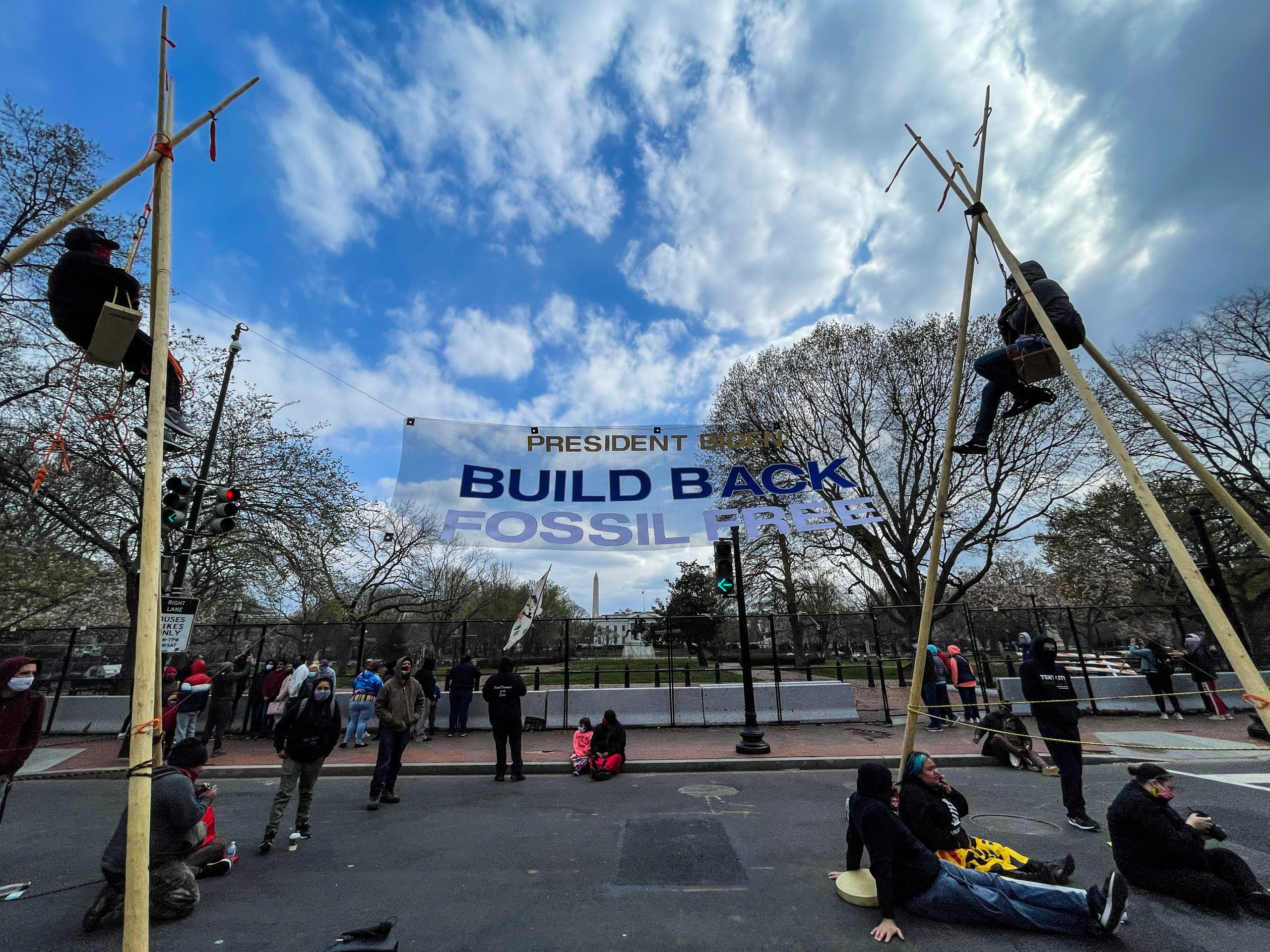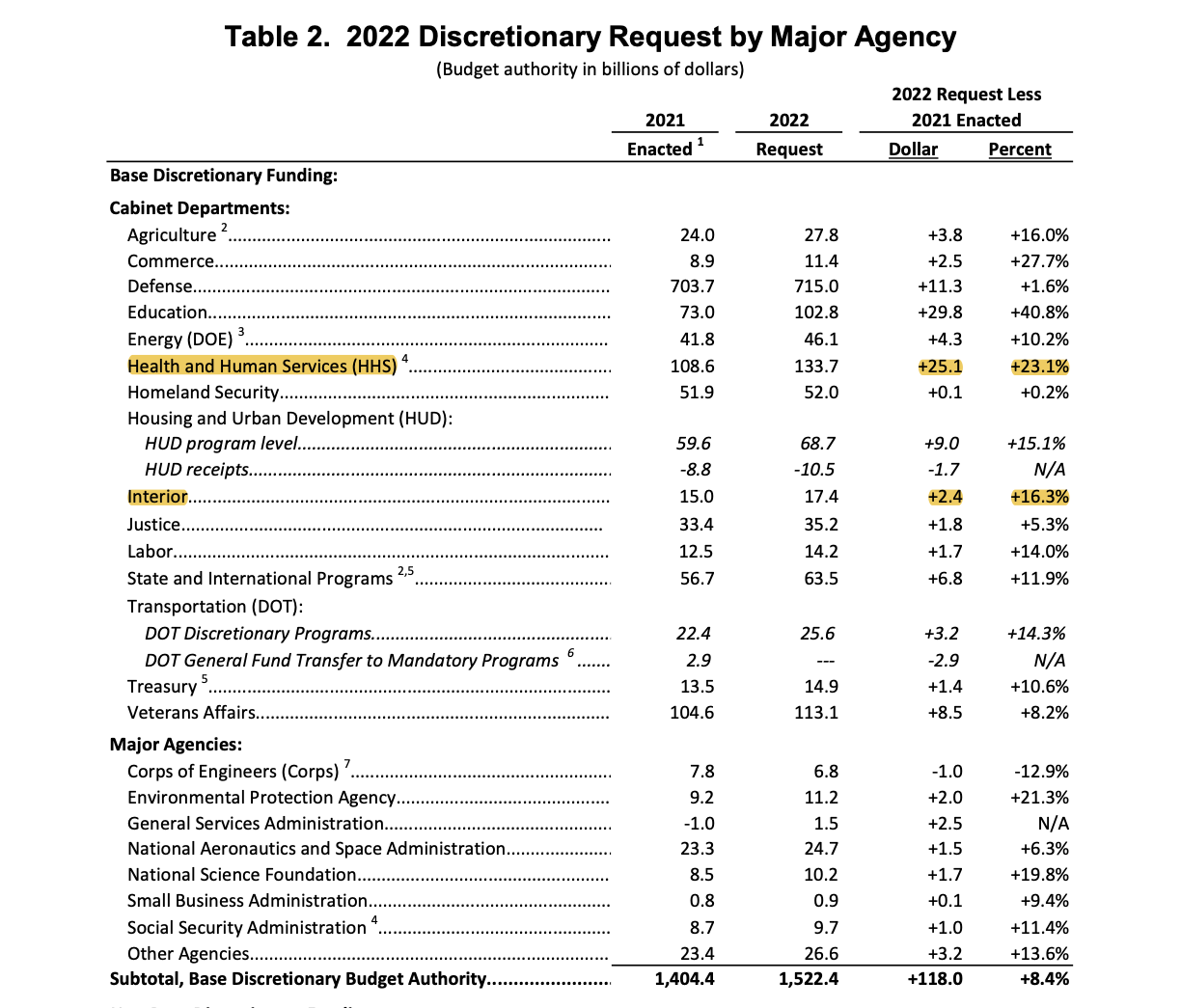Indianz.Com > News > President Biden submits first budget request in age of COVID-19

President Biden submits first budget request in age of COVID-19
Friday, April 9, 2021
Indianz.Com
President Joe Biden has submitted his first budget to Congress, showing increases in investments for Indian Country.
The fiscal year 2022 discretionary request offers a broad outline of the Biden administration’s priorities. Reversing cuts of the past and recovering from the COVID-19 pandemic are common themes of the documents released by the White House Office of Management and Budget (OMB) on Friday morning.
“The upcoming appropriations process is another important opportunity to continue laying a stronger foundation for the future and reversing a legacy of chronic disinvestment in crucial priorities,” Shalanda D. Young, the acting director of the OMB, wrote in a letter to key members of Congress.
What follows are highlights of interest to Indian Country from the FY2022 budget request. Sections will be added as the document is reviewed.
Secretary Deb Haaland is praising President Biden for seeking more funds for the Department of the Interior, the federal agency with the most trust and treaty responsibilities in Indian Country. @SecDebHaaland @Interior #DebHaaland #FY2022 https://t.co/IHGj2WnpdF
— indianz.com (@indianz) April 9, 2021
Upholding America’s Trust Responsibility to Tribal Nations
Promotes Health Equity for American Indians and Alaska Natives. To begin redressing long-standing, stark health inequities experienced by American Indians and Alaska Natives, the discretionary request proposes to dramatically increase funding for the Indian Health Service (IHS) by $2.2 billion. In addition, to ensure a more predictable funding stream for IHS, the discretionary request for the first time includes an advance appropriation for IHS in 2023.
Invests in Affordable Housing in Tribal Communities. Native Americans are seven times more likely to live in overcrowded conditions and five times more likely to have plumbing, kitchen, or heating problems than all U.S. households. The discretionary request helps address the poor housing conditions in tribal areas by providing $900 million to fund tribal efforts to expand affordable housing, improve housing conditions and infrastructure, and increase economic opportunities for low-income families.
Helps Tribal Nations Address the Climate Crisis. Tribal communities are particularly vulnerable to the impacts of climate change, which threatens their cultural and economic well- being. The discretionary request provides an increase of more than $450 million to facilitate climate mitigation, resilience, adaptation, and environmental justice projects in Indian Country, including investment to begin the process of transitioning tribal colleges to renewable energy.
Department of Education: Higher Education
Increases Funding for Historically Black Colleges and Universities (HBCUs), Tribally Controlled Colleges and Universities (TCCUs), Minority-Serving Institutions (MSIs), and Community Colleges to Enroll, Retain, and Graduate Students. The discretionary request would increase institutional capacity and student support at HBCUs, TCCUs, MSIs, and low-resourced institutions, including community colleges. The discretionary request provides an increase of more than $600 million over the 2021 enacted level for these programs. These funds would also support programs that provide additional help to disadvantaged students, including those at community colleges, to ensure they succeed in and graduate from college.

Department of Health and Human Services
Promotes Health Equity by Investing in Services for American Indians and Alaska Natives. The discretionary request proposes to begin redressing long-standing health inequities experienced by American Indians and Alaska Natives by dramatically increasing funding for IHS. The discretionary request includes $8.5 billion in discretionary funding for IHS in 2022, an increase of $2.2 billion. In addition, to ensure a more predictable funding stream for IHS, the discretionary request for the first time includes an advance appropriation for IHS in 2023 to support Administration and tribal priorities. The Administration is also committed to a robust consultative process with Tribes, tribal organizations, urban Indian organizations, and relevant stakeholders to evaluate options, including mandatory funding, to provide adequate, stable, and predictable funding for IHS in the future.
Promotes Health Equity by Addressing Racial Disparities. The Nation must continue taking swift action to prevent and remedy stark racial disparities in health and healthcare in America, some of which the COVID-19 pandemic crisis has laid bare. The discretionary request builds on the American Rescue Plan Act of 2021 to advance equity and reduce health disparities in all healthcare programs. The discretionary request provides additional funding to increase the diversity of the healthcare workforce and expand access to culturally competent care. The discretionary request also includes $153 million for CDC’s Social Determinants of Health program, an increase of
$150 million over the 2021 enacted level, to support all States and Territories in improving health equity and data collection for racial and ethnic populations.
Provides Funding to Reduce the Maternal Mortality Rate and End Race-Based Disparities in Maternal Mortality. The United States has the highest maternal mortality rate among developed nations, with an unacceptably high mortality rate for Black and American Indian/Alaska Native women. To help end this high rate of maternal mortality and race-based disparities in outcomes, the discretionary request includes more than $200 million to reduce maternal mortality and morbidity rates nationwide, bolster Maternal Mortality Review Committees, expand the Rural Maternity and Obstetrics Management Strategies program, help cities place early childhood development experts in pediatrician offices with a high percentage of Medicaid and Children’s Health Insurance Program patients, implement implicit bias training for healthcare providers, and create State pregnancy medical home programs.
Addresses the Public Health Epidemic of Gun Violence in America. The Administration is committed to addressing gun and other violence as a public health issue. Almost 40,000 people die as a result of firearm injuries in the United States every year, while homicide is the third leading cause of death for people ages 10-24. The crisis is particularly acute in communities of color, as Black men make up six percent of the population but over 50 percent of gun homicide victims, and American Indians/Alaska Natives and Latinos are also disproportionately impacted. To address the violence epidemic, the discretionary request doubles funding for firearm violence prevention research at CDC and NIH and includes $100 million for CDC to start a new Community- Based Violence Intervention initiative—in collaboration with Department of Justice—to implement evidence-based community violence interventions locally.
Department of Housing and Urban Development
Invests in Affordable Housing in Tribal Communities. Native Americans are seven times more likely to live in overcrowded conditions and five times more likely to have plumbing, kitchen, or heating problems than all U.S. households. The discretionary request helps address poor housing conditions in tribal areas by providing $900 million to fund tribal efforts to expand affordable housing, improve housing conditions and infrastructure, and increase economic opportunities for low-income families.
Department of the Interior
Honors America’s Commitments to Tribal Nations. The Federal Government must uphold the United States’ trust responsibility to tribal nations, strengthen the Nation-to- Nation relationship, and empower tribal nations to govern their own communities. The discretionary request provides $4 billion, more than $600 million over the 2021 enacted level, to fund a range of DOI tribal programs, including for teachers and students in tribal schools, clean energy development, and tribal law enforcement and court programs to improve safety. These investments would directly enhance the educational opportunities of the 46,000 students in tribal schools, support the effective management of the
56 million acres of lands held in trust for the benefit of tribal nations—the largest land trust in the world—and strengthen self-determination and self-governance programs to bolster tribal sovereignty. These investments would also complement the substantial investments in Indian Country provided by the American Rescue Plan Act of 2021, as well as other investments in the discretionary request that support and strengthen tribal communities.
Department of Justice
Invests in Efforts to End Gender-Based Violence. The discretionary request proposes a historic investment of $1 billion to support Violence Against Women Act (VAWA) programs at DOJ, a $487 million or 95-percent increase over the 2021 enacted level. This funding supports substantial increases for longstanding VAWA programs, in addition to funding for new programs to expand restorative justice efforts, protect transgender survivors, and support women at Historically Black Colleges and Universities, Hispanic-Serving Institutions, and Tribal Colleges to ensure these institutions have the same resources as other schools to address this pervasive issue. The request also provides $120 million, an increase of $72 million above the 2021 enacted level, to the Office of Justice Programs to address the rape kit backlog and to fund a new Regional Sexual Assault Investigative Training Academies program. These investments complement the American Rescue Plan Act of 2021’s efforts to combat increased risk of gender-based violence due to the COVID-19 pandemic, and additional investments in the Department of Health and Human Services.
Environmental Protection Agency
Delivers Environmental Justice for Overburdened and Marginalized Communities. For decades, low-income and marginalized communities have been overburdened with air pollution and other environmental hazards. The discretionary request invests
$936 million toward a new Accelerating Environmental and Economic Justice initiative that would help create good-paying jobs, clean up pollution, implement Justice40 and advance racial equity, and secure environmental justice for communities who too often have been left behind, including rural and tribal communities. This includes $100 million for a new community air quality monitoring and notification program and an additional $30 million to enforce existing laws meant to protect communities from hazardous pollution and hold polluters accountable. In addition, the discretionary request increases funding for the Diesel Emissions Reduction Act grant program. These investments build on the funding provided in the American Rescue Plan Act of 2021.
Invests in Critical Water Infrastructure and Creates Jobs. The discretionary request provides a total of $3.6 billion for water infrastructure, an increase of $625 million over the 2021 enacted level. These funds could be used to advance water infrastructure improvement efforts for community water systems, schools, and households, such as repairing up to 180,000 septic systems, as well as broader efforts to improve drinking water and waste water infrastructure while creating good-paying construction jobs across the Nation and in tribal communities.
Fiscal Year 2022 Budget Request Letter: PDF
FY2022-Discretionary-Request
Fiscal Year 2022 Budget Press Release: PDF
FY2022-Discretionary-Request-Press-Release
Search
Filed Under
Tags
More Headlines
Native America Calling: Tribes addressing the ‘forever chemical’ problem
Senate Committee on Indian Affairs takes up water rights at legislative hearing
Senate Committee on Indian Affairs schedules business meeting
Montana Free Press: ‘White farmers’ ad airs amid racial baiting in U.S. Senate race
Cronkite News: Navajo Nation rallies at U.S. Capitol for radiation compensation
Native America Calling: Turning athletics into academic success
Daily Montanan: U.S. Senate candidate sidesteps questions about ‘drunk’ Indians
Cronkite News: Navajo Nation asserts authority over uranium shipments
NAFOA: 5 Things You Need to Know this Week
Chuck Hoskin: Cherokee Nation asserts sovereignty over our health
Native America Calling: Balanced lessons on missions and the gold rush in California
‘Racism is expensive’: Native activists still fighting for justice on treaty territory
Native America Calling: Studies show major tribal economic impact
Native America Calling: The scars left behind by wildfires
AUDIO: Nomination Hearing to consider Patrice H. Kunesh to be Chair of National Indian Gaming Commission
More Headlines
Senate Committee on Indian Affairs takes up water rights at legislative hearing
Senate Committee on Indian Affairs schedules business meeting
Montana Free Press: ‘White farmers’ ad airs amid racial baiting in U.S. Senate race
Cronkite News: Navajo Nation rallies at U.S. Capitol for radiation compensation
Native America Calling: Turning athletics into academic success
Daily Montanan: U.S. Senate candidate sidesteps questions about ‘drunk’ Indians
Cronkite News: Navajo Nation asserts authority over uranium shipments
NAFOA: 5 Things You Need to Know this Week
Chuck Hoskin: Cherokee Nation asserts sovereignty over our health
Native America Calling: Balanced lessons on missions and the gold rush in California
‘Racism is expensive’: Native activists still fighting for justice on treaty territory
Native America Calling: Studies show major tribal economic impact
Native America Calling: The scars left behind by wildfires
AUDIO: Nomination Hearing to consider Patrice H. Kunesh to be Chair of National Indian Gaming Commission
More Headlines